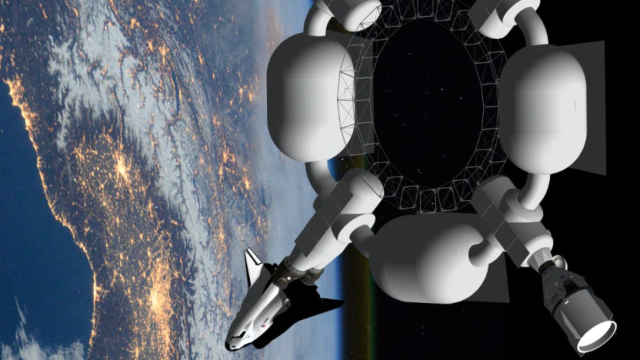Orbital Assembly Corporation announced plans to develop a space business park, complete with artificial gravity, that’s designed to accommodate 28 guests in five modules built around a rotating gravity ring.
The California startup is aiming to make its first Pioneer-class space station operational by 2025, in what is an ambitious and likely unrealistic timeline. That said, Orbital Assembly is intent on making this the first commercial, hybrid space station that can be leveraged for both research and leisure.
The Pioneer station is one of two designs for commercial space stations currently being developed by the company, the first being the Voyager Station announced back in 2021. However, Pioneer is meant to precede Voyager, a larger undertaking that will be built with the aim of it being a sort of luxury space hotel capable of accommodating 400 guests at a time.
In an emailed statement, Rhonda Stevenson, chief executive officer of Orbital Assembly, said the Pioneer design is “a safe, secure, and reliable modular station that will generate revenue and profitability from both the tourist and commercial sectors sooner than our competitors who are adhering to NASA timetables.”
In December 2021, NASA awarded three contracts to privately owned U.S. companies Blue Origin, Nanoracks, and Northrop Grumman to develop low Earth orbit space stations for both public and commercial use. NASA is aiming to have these space stations in orbit and operational by 2030.
The privately owned space stations are meant to take the place of the International Space Station (ISS), an orbiting laboratory that currently accommodates astronauts from NASA and the European Space Agency, as well as cosmonauts from Russia’s Roscosmos. However, the current plan is to retire the ISS in 2030 by plunging it into a remote region of the Pacific Ocean known as Point Nemo. The public-private hybrid space stations commissioned by NASA are meant to take the place of ISS in low Earth orbit, where they will serve both research and commercial interests.
Private space company Axiom Space is also planning to build its own commercial space station, one designed to house future visitors and host scientific research. Axiom is hoping to launch the first section of the station to low Earth orbit in 2024.
Despite the pending competition, Orbital Assembly is hoping to become the dark horse of commercial space tourism. “Multiple revenue streams from commercial, research and tourism markets will enable us to subsidise the travel market for a one to two-week stay,” Stevenson said. “While launch costs continue to be a barrier, we expect tourists will be motivated to plan shorter, or more frequent, stays as space travel becomes less expensive.”
The orbiting Pioneer outposts are designed to simulate one-sixth of Earth’s gravity, which they’ll do by spinning around a gravity ring that measures about 200 feet (61 meters) in diameter. Having a weightless environment on a space station would allow people to still move around “while eating or drinking out of a cup normally and sleeping without having to be attached to a bed,” according to the company’s statement. Creating artificial gravity is also a way to mitigate the detrimental health effects of microgravity on the human body.
Orbital Assembly previously announced that it would start building its larger Voyager space station by 2025 and that it would become operational in 2027. That timeline has been met with scepticism from the industry, but the recent statement from the company suggests Pioneer will be up and running before Voyager is in orbit.
In early February, the company, which runs on private investment, announced $US1 ($1) million in newly raised funding, which allowed for a slew of new hires. It will likely need to acquire more money if it hopes to build an orbiting space station; for reference, NASA allocated a total of $US415.6 ($577) million for the three contracts awarded to Blue Origin, Nanoracks, and Northrop Grumman.
Space tourism is a tempting and potentially lucrative business that’s attracting a lot of corporate attention right now. This nascent industry is still taking shape, however, and the challenges of actually building out a flying space hotel remain unknown, as is the willingness of people to cough up millions for a ticket to space.
